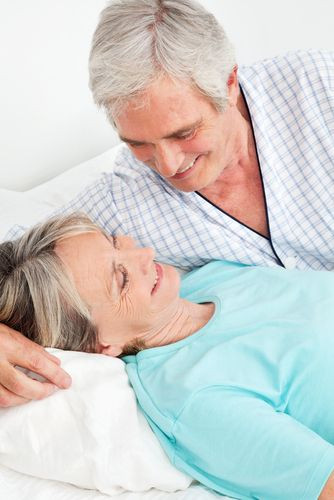Your Aging Sex Drive: What’s ‘Normal’ After Menopause?

Famously, when a reporter told feminist icon Gloria Steinem in 1974 that she didn’t look her age, Steinem responded, “This is what 40 looks like — we’ve been lying for so long, who would know?” At that time, she believed growing older was a penalty for women. Whether or not she still sees age as a handicap unique to women, one thing is certain: She believes in a dwindling libido, which she herself admits to experiencing. Yet she considers it not so much a problem, as too many women do, but an overall advantage. “The brain cells that used to be obsessed are now free for all kinds of great things,” she recently told The New York Times.
For many women this perspective may come as a welcome surprise. Too often women’s sexual feelings are criticized or even pathologized, with women held to standards few can meet … or wish to meet. The (admittedly few) articles written about the sexual lives of older women either focus on the rare, insatiable cougars, or they retread advice appropriate for a woman in her twenties. Meanwhile, many post-menopausal women, who are dealing with vaginal dryness or painful intercourse or a simple lack of motivation, may be left wondering, Is my experience normal? (As in, healthy-normal signs of growing older, as opposed to I need to have a doctor check me out.) Other aging veterans of the sexual revolution may be sick-to-death of the constant temperature-taking when it comes to sex. At what age does self-acceptance come — must comparisons to other women continue into old age?
Well the good news is that all and any experience is pretty much normal when it comes to an aging woman and her libido. (Surprise?) According to the Kinsey Institute, annually, almost 47 percent of women over the age of 50 masturbate a few times or more, nearly 25 percent give and receive oral sex, while 42 percent have penile-vaginal intercourse. Typical of many sex reports or studies, these figures are so wildly inexact — too wide an age range to reveal any kind of scientific truth. But imprecision also leaves room for imagination and individuality... fill in the blank, as you please.
Other sources provide a more distinct picture of aging libido. For instance, the North American Menopause Society (NAMS), a nonprofit with a multidisciplinary membership including medical experts, states that sex drive generally and gradually decreases with age in both men and women and this process often begins starting in the late 40s. That said, NAMS suggests the effects of age differ from individual to individual, with some women experiencing a big decrease in sexual desire, others noticing no change, and a few reporting increased interest in sex at midlife. This general view of things, though, is pretty much the standard opinion of aging libido.
NAMS also posts recommendations for women who wish to address any sexual problems they encounter. Heading up the list is low libido, followed by vaginal dryness and/or atrophy, arousal difficulties, orgasm difficulties, and pain during sex. It's worth a look if only to check off all possible actions; among the possible therapies to be considered are counseling, medications, creams, yoga, and devices. One unusual recommendation that comes not from NAMS but from a female writing in to the comments section is the pelvic toner, which helps a woman exercise her pelvic floor. Since many women find some form of vaginal and bladder issue to be the root cause of their sexual difficulties, this could be the most effective remedy. Best of all, exercise is a way to tackle the problem naturally, without drugs.
Post-menopause, most women aim for a quality life in all ways. Why not begin with accepting whatever you feel and building, if you wish, from there? You are always the best judge of what is right for you.
Published by Medicaldaily.com



























